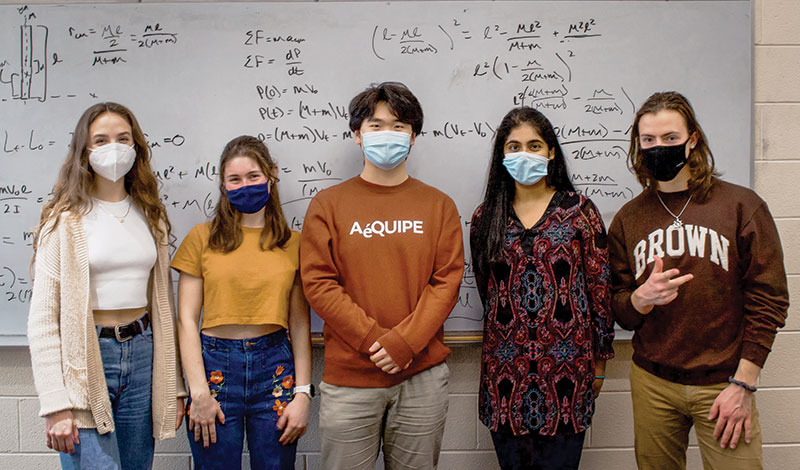Breaking through Barriers in Physics
Winter
2022
Feature
Breaking through Barriers in Physics
Joseph Hall, Taylor Knapp, Jasper Chen, and Isabel Horst, SPS Members, Brown University
As wonderful as physics is, students and professionals alike often face significant challenges. These barriers range from those that can affect us all, such as mental health issues and poor work/life balance, to systems of oppression that specifically target groups historically underrepresented in science. Throughout the pandemic and into the fall 2021 semester, the Brown University SPS chapter has strived to provide balanced academic and social support to our community, with an emphasis on making physics feel more accessible and welcoming.
One way we’ve supported these goals is by hosting workshops called Barriers in Physics. These events are open to all interested undergraduates and focus on addressing common issues and misconceptions within the physics community.
For a workshop on imposter syndrome—defined by Merriam-Webster as “a false and sometimes crippling belief that one’s successes are the product of luck or fraud rather than skill”—we asked tenured professors to write letters about the doubts and setbacks they faced in their careers and how they overcame them. We were incredibly grateful to have over a dozen senior professors contribute to this event. Consider some of their responses:
“Imposter syndrome for me manifests as that internal voice that attributes successes to luck or to distraction on the part of others, while replaying failures/mistakes vividly.”
“The kryptonite to imposter syndrome is the courage to face my own ignorance and the willingness to learn whatever I didn’t know before.”
“I immediately thought they chose me because I am a woman and not because I was an expert in the matter, and that I will never measure up to the level of leadership provided by my predecessor.”
“There’s a huge difference between ‘I don’t belong in physics’ and ‘This environment is not a good fit for me.’”
As physics students, our understanding of imposter syndrome was completely transformed by the knowledge that many of our role models have and continue to work through the same fears and anxieties. While imposter syndrome is sadly pervasive, it helped the student participants to realize that others have felt the same way and have been able to go on and succeed.
Another challenge we tried to address in the past year was the prevalent feelings of alienation and loneliness among students due to remote learning. For a workshop on community and belonging, we asked students to reflect on their own feelings, as well as to identify shared aspects of their experience with others. The event included introductions, a short journaling exercise, and breakout groups in which participants discussed the following questions: Are any of the reasons people might not feel a part of the scientific community unavoidable? What actions can be taken to help others feel like they belong in physics?
We also discussed how losing historical context for scientific discovery, particularly the erasure of female physicists and physicists of color, reinforces the idea that scientific intuition is inborn or related to “talent” rather than something all people are capable of. This mistaken belief was a big reason many participants doubted their abilities early on and considered switching majors.
Physics is plagued by the myth that progress is made by one person, particularly the stereotype of the lone genius at a chalkboard. While some important historical individuals in physics fit this profile, this view is wholly distorted. Scientific progress is built through collaboration, and everyone should be encouraged to contribute. It is important that we, as SPS members, spread the feeling of belonging and build community in physics so we can break down these barriers. Our goal is to continue the work of making the physics community at Brown—and beyond—more welcoming, accessible, and inspiring.

